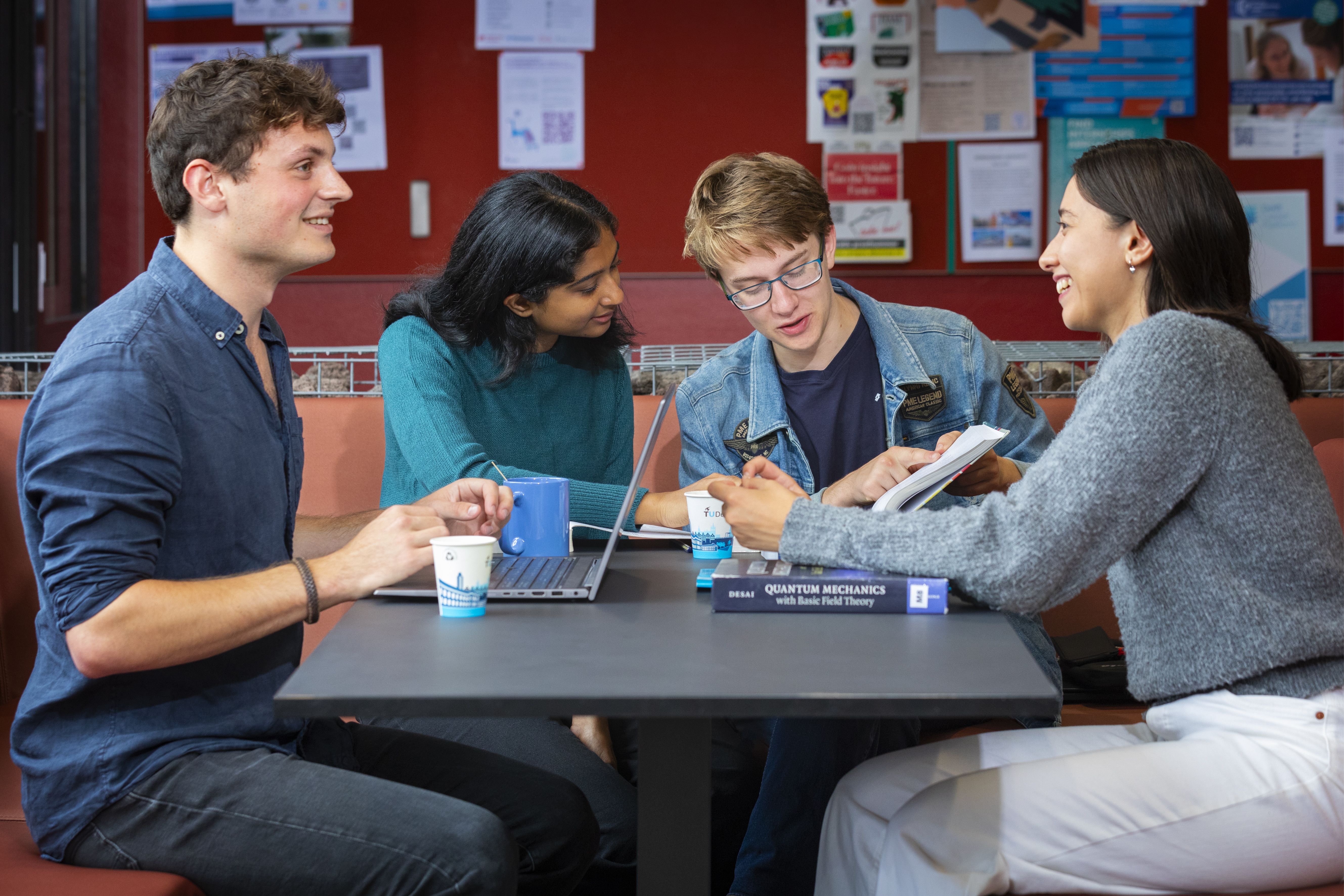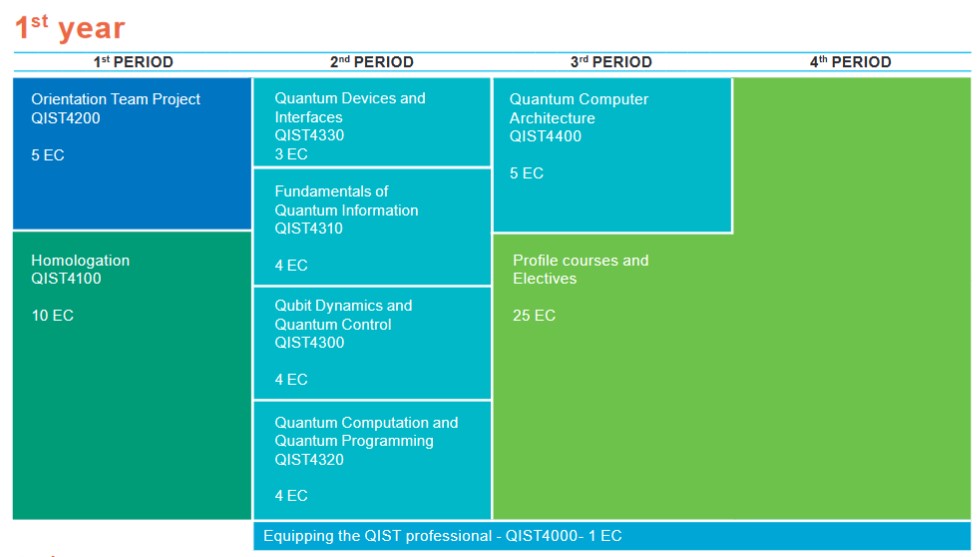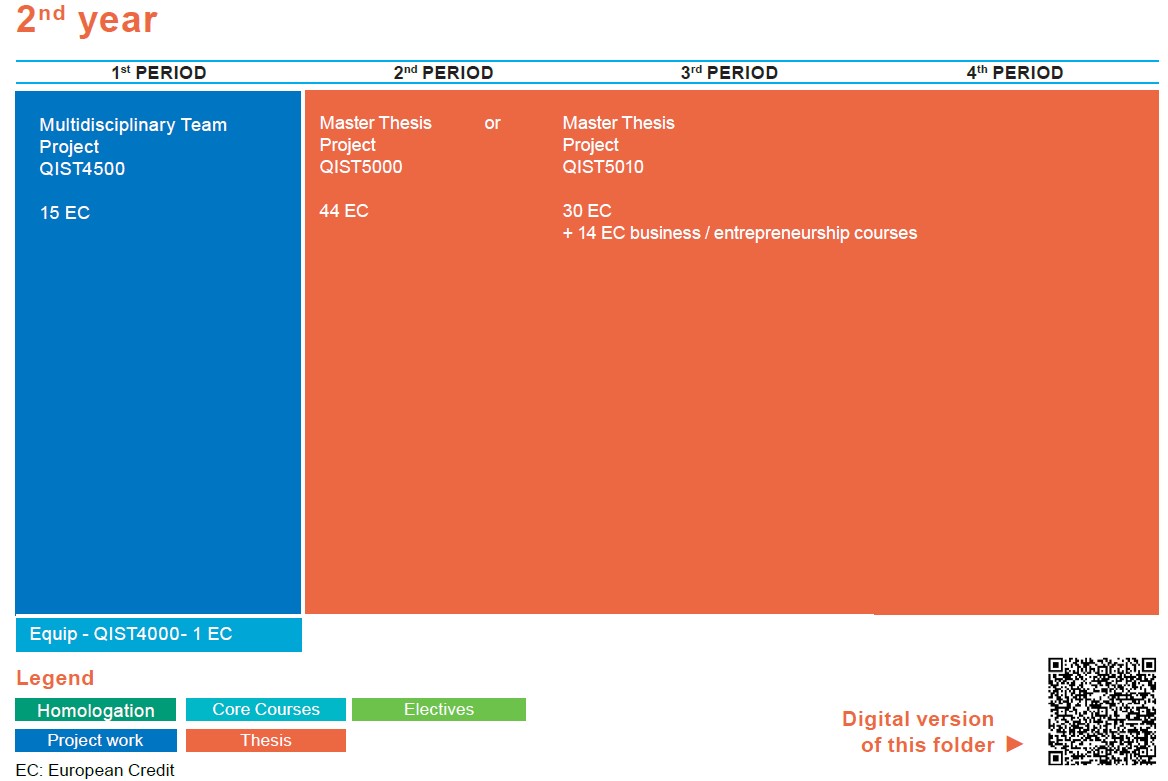Programme
Introduction to the curriculum
This programme will provide you with the knowledge, insights and skills required to perform independent professional and scientific activities in the field of quantum information science and technology at the level of a Master of Science. During the programme, you will acquire in-depth knowledge, both theoretical and applied, of quantum hardware, quantum software and electronics for quantum applications. You will work on research and design projects, both individually and in multidisciplinary teams, together with fellow students and professionals from universities, research institutes, and industry parties. In the process, you will learn to translate abstract concepts into practical ones and to effectively communicate your insights both to quantum technology experts and laypeople.
After the core programme in the first half of the first year, you have a choice of many different elective courses and will be able to specialise in one of the three application areas of quantum technology: quantum computing and simulations, quantum communication, or quantum sensing and metrology. Teaming up with others in small groups, you will also regularly work and reflect on personal and transferable skills, as well as societal and ethical implications of quantum technology throughout the two-year programme.
The first quarter of the programme consists of homologation modules and a team project. The aim of the homologation modules is to allow all students, with different levels and types of background knowledge, to acquire essential fundamental knowledge and learn skills from the disciplines that were not a part of their bachelor programme but are required to successfully master the core courses in the second and (part of the) third quarter.
After the core programme, students can choose from a wide range of elective courses and specialise in one of the three application areas of quantum technology: quantum computing and simulations, quantum communication, or quantum sensing and metrology.
Students can take electives worth 25 EC in year 1, choosing from courses on (Applied) Physics, Computer Science, Mathematics and Electrical Engineering taught at both Leiden and Delft.
In year 2, students start with a 15 EC multidisciplinary team project, followed by an individual master’s thesis project. For the thesis project, they can choose between 2 orientations:
- Research and design orientation: a 44 EC research-oriented or design and/or system integration-oriented project in one of the research groups in Leiden or Delft affiliated with the QIST programme.
- Business orientation: a 30 EC application-oriented research project in collaboration with a company under the final responsibility of a supervisor in one of the research groups affiliated with the QIST programme plus courses for a total of 14 EC on technology management and entrepreneurship.
After the core programme each student chooses a profile: through elective courses more specialised knowledge in one of the three application areas of quantum science and technology (quantum computing and simulations, quantum communication or quantum sensing and metrology) is acquired, see also article 4.
The elective courses build on the core programme (see article 5.1.2) and aim at breadth as well as depth in specific topics. They focus on scientific and technical subjects relating to and recommended for at least one of the profiles (quantum computing and simulations, quantum communication, quantum sensing and metrology). For each profile, the student should take the elective course(s) specified under a.-c. below. The remaining courses can be taken from the general list under d. below.
-
Students wishing to specialise in the profile quantum computing and simulations are advised to take at least one of the following three courses:
AP3432 Quantum Hardware 1 - Theoretical Concepts 4EC WI4659 Applied Quantum Algorithms 6EC 4343APQAL Applied Quantum Algorithms 6EC
The remaining elective courses can be chosen from the list of general elective courses under d. -
Students wishing to specialise in the profile quantum communication are advised to take at least one of the following courses:
CS4090 Quantum Communication and Cryptography 5EC AP3432 Quantum Hardware 1 - Theoretical Concepts 4EC
The remaining elective courses can be chosen from the list of general elective courses under d. -
Students wishing to specialise in the profile quantum sensing and metrology are advised to take the following course:
AP3432 Quantum Hardware 1 - Theoretical Concepts 4EC
The remaining elective courses can be chosen from the list of general elective courses under d. -
Offered by Course name EC Recommended background Delft AP3432, Quantum Hardware 1 - Theoretical Concepts 4 all Delft AP3442, Quantum Hardware 2 - Experimental State of the Art 4 all (quantum hardware 1 is required prior knowledge) Delft CS4090, Quantum Communication and Cryptography 5 all
Delft AP3421-PR, Quantum Information Project 2 all Delft AP3452, Quantum Error Correction 4 all Delft WI4650, Applied Quantum Algorithms 6 all Delft EE4C11 Systems Engineering 3 all
Delft EE4C10, Analog Circuit Design Fundamentals 5 all
Delft EE4700, Modelling, Algorithms and Data Structures 5 all Delft EE4C06, Networking 5 all Delft CS4220, Machine Learning 1 5 all Leiden 4343APQAL, Applied Quantum Algorithms 6 all Leiden 4343INTML, Introduction to machine learning 6 all Leiden 4609COMNW, Complex Networks 6 all Delft CS4240, Deep learning 5 computer science Delft CESE4010, Advanced Computing Systems 5 electrical engineering, computer science Delft EE4520, Analog CMOS design I 3 electrical engineering (requires as prior knowledge EE4C10) Delft EE4C12, Machine Learning for Electrical Engineering 5 electrical engineering Delft EE4585, Semiconductor device physics 5 electrical engineering, physics Delft EE4610, Digital IC design 3 electrical engineering Delft ET4252, Analog IC design 4 electrical engineering Delft ET4351, VLSI Systems on Chip Architectures 4 electrical engineering Delft EE4C08, Measurement and Instrumentation 5 electrical engineering Delft EE4705, Solid-state physics 3 electrical engineering, not physics, not together with EE4710 Delft EE4710, Solid-state physics with quantum and nano-electronics 6 electrical engineering, not physics, not together with EE4705 Delft ET4391, Advanced Microelectronics packaging 3 electrical engineering, physics Delft WI4006, Special functions and Representation Theory 5 mathematics Delft WI4046, Spectral Theory of linear operators 6 mathematics. Prior knowledge on (applied) functional analysis from WI4203 or equivalent is required. Delft WI4450, Special Topics in Computational Science and Engineering 6 mathematics. physics and electrical engineering: check studyguide (topic varies every year) Leiden 4373QUIT6, Quantum Information Theory 6 mathematics (course given every other year) Leiden 4373REPTH, Representation Theory 6 mathematics Leiden 4373INTDS, Introduction to Dynamical Systems 6 mathematics Leiden 4082LINAN, Linear Analysis 6 mathematics Mastermath Semidefinite Optimisation 8 mathematics. Taught at Free University (Spring 2024) Mastermath Continuous Optimisation 6 mathematics Taught at Utrecht University (Fall 2023) Delft AP3051, Advanced Quantum Mechanics 6 physics Delft AP3303, Applications of Quantum Mechanics 3 physics Delft AP3281, Quantum Transport 6 physics Delft AP3082, Computational physics 6 physics (not in combination with 4403CMPH3 or 4403CMPH6) Delft AP3222, Nanotechnology 6 physics Delft AP3751, Artificial Intelligence for physicists 4 physics Delft AP3261, Mesoscopic Physics 6 physics Delft AP3211, Advanced Solid State Physics 6 physics, electrical engineering (provided they fulfill the criteria on required prior knowledge specified in the studyguide) Delft AP3252, Electron Microscopy Characterization of the Nanoscale 3 physics Delft AP3113, Quantum Optics and lasers 6 physics Leiden 4403QUTH6, Quantum Theory 6 physics Leiden 4403QOPT6, Quantum Optics 6 physics Leiden 4403COPH6, Condensed Matter Physics 6 physics (Students with a BSc diploma in electrical engineering who have completed a course on basics of solid-state physics are also eligible) Leiden 4403TCM06, Theory of Condensed Matter 6 physics AND requirements as specified in the Leiden study guide Leiden 4403PHCQI, Physics and Classical/Quantum Information 6 physics Leiden 4403CMPH3, Computational Physics 3 physics. Not in combination with AP3082 Leiden 4403CMPH6, Computational Physics 6 physics. Not in combination with AP3082 Leiden 4403STPHAY Statistical Physics 6 physics Leiden 4403EFTH Effective Field Theory 3 physics If a student wishes to take an elective course or module that is not listed in the table above, approval from the Board of Examiners must be obtained.


